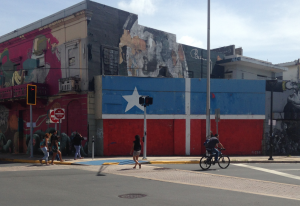Kasumi Hirokawa, PA, USA, SSH Blog Correspondent
As a car window rolled down, I waited. Perhaps my boyfriend saw it coming, too. “Chinky legs, chinky legs, chinky legs! Ayeeeee!” A male voice chanted at us when we crossed the street, hand in hand.
It was the second time people shouted insensitive remarks at us. Or to me? I do not know. Both incidents I experienced seemed to involve men yelling Asian slurs. Somehow in 2014, the sight of an East Asian woman and a black man linking arms still offends people. The sight of two people in love.
State College, Pa. is a small town of approximately 41,757, according to the United States Census data as of 2013. It’s also very white. The data estimates 83% of the town residents identified as white in 2010. I have also heard that Pennsylvania is one of KKK’s favorite hangouts from multiple sources, including this article by TIME magazine. However, none of these justify hate.
I still remember the first time something like it happened. I think I will never forget if it happens again. It was on our way home from a formal at a mutual friend’s house. We were walking back as we passed by a pair of wobbling white men when my boyfriend abruptly turned around and stopped. “What is it?” I asked. He replied through his clenched teeth, “I thought I heard them say horrible things. Something like ‘sideways pussy.’ Did you hear it?” I was not paying enough attention to even notice it. But my boyfriend is not the kind to make this sort of things up, especially when it is obvious that I am tired.
Unable to find much reliable literature on harassment against interracial couples online, I wondered if similar things happen to other interracial couples. I sought out a few friends of mine, each of whom was in at least one interracial relationship.
Mandy* is an Asian American woman and a student at a local university. She said she was at the receiving end of “judgmental” stares when she was with her boyfriend, who is black, for a gathering in a campus building. She recalled being the only Asian girl in the room: “People [kept asking me], ‘Are you with him?’”
Kyle*, a recent college graduate who lives in Green Lane, Pa., said he and his former partner was never subjected to “direct attack” from strangers but they “caught bad looks and [received] poor service” at restaurants. He said waiting staff would bring food to others who were seated after them – a white man and a black woman. “Waitresses wouldn’t stop by as frequently and you could see them looking [at us],” he recounted.
The days of racism and sexism are seemingly over in the eyes of those who refuse to look at what is happening around them. Who knows what the person behind you in the Starbucks line thinks about another from a different racial, religious or sexual orientation groups? They would shake hands with a fake smile with anyone when sober. How about when their PC façade is washed down by alcohol, mob mentality or raging sense of entitlement? Just like creepy comments hurled at me when I’m alone, these hurtful words and gestures are supposed to remind us that we have stepped out of the line and the harassers have the power to police us.
Kasumi is a recent graduate from Penn State with a BA in journalism. Her writing has been published in Valley Magazine, City Weekend Shanghai, Penn State GeoBlog and Shanghai Daily. You can follow her on Twitter, @kasumihrkw

